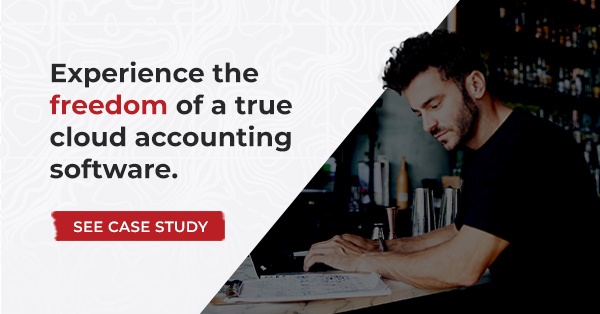Cloud accounting software that doesn't compromise: Why cloud-native matters

The concepts of cloud computing and cloud-based software have become so ubiquitous that their true meaning has gotten a bit clouded.
When it comes to cloud accounting software, for instance, some companies claim to offer cloud solutions when, in reality, they're simply desktop applications with limited online functionality. Users of these platforms often experience technical difficulties, such as inconsistent data syncing and higher total cost of ownership.
In cloud software, two main models exist: cloud-native and cloud-based. Let’s break down the differences and explain why cloud-native accounting software is the smarter investment.
What's makes cloud accounting software valuable?
Arguably the most valuable feature of cloud computing is that it lets users access powerful infrastructure—like servers and large-scale databases—without maintaining that hardware on-site. Applications built for the cloud (commonly known as Software as a Service, or SaaS) are accessible from anywhere you have an internet connection.
For accounting teams, this enables seamless collaboration, real-time updates, reduced IT overhead, and improved scalability. But the full benefits are only realized when the software is truly cloud-native.
What is cloud native accounting software?
Cloud-native software is built to run in the cloud from the ground up. It fully leverages the benefits of cloud computing and is hosted and operated entirely online.
This approach provides major advantages:
- No need for costly on-premises servers or hardware.
- Lower IT maintenance and hosting costs.
- Instant access from any device with internet.
Gravity Software is a true cloud-native accounting solution. It's built on the Microsoft Power Platform, part of the Microsoft Cloud ecosystem.
Using the analogy of a building: if the software is a structure, then the cloud platform is its foundation. Gravity Software is constructed directly on a cloud-native foundation, meaning every aspect of its functionality is designed for cloud delivery.
What is cloud-based accounting software?
Cloud-based software refers to legacy desktop applications that have been retrofitted with online access. While some elements may live in the cloud, the full software experience still relies on local installations or on-premise servers.
Returning to our building analogy: this is like building a house and renting a storage unit across town. You can access a few things remotely, but the main structure remains tied to a fixed location.
Take Sage 50cloud as an example. Though marketed as a cloud solution, it requires users to download and install the software on their desktop. Some remote functionality exists, but real-time access and data integrity often suffer.
Software Advice reviewers have reported syncing failures and data loss due to poor cloud integration in Sage 50cloud. These issues aren’t uncommon with cloud-based tools.
According to ETCIO, other limitations of cloud-based accounting platforms include:
- Maintenance complexity due to hybrid infrastructure.
- Delayed innovation, as updates often require downtime.
- Additional costs for hosting or syncing services.
While cloud-based software might work for companies unwilling to overhaul their infrastructure, it’s less ideal for businesses choosing a solution for the first time.
If you're a company starting the search for new software, however, cloud-native is likely the best option.
Why cloud-native accounting software is the better choice
If you're evaluating cloud accounting software, opting for a true cloud-native platform like Gravity Software gives you:
- Real-time access: Your data is always up to date. No syncing delays or version conflicts.
- Lower total cost of ownership: No separate hosting, upgrade, or maintenance fees.
- Automatic updates: Enjoy continuous improvement with no downtime.
- Better scalability: Easily add users or entities without reconfiguring your IT setup.
- Stronger integrations: Built-in compatibility with Power BI, Power Automate, and other Microsoft and third-party tools.
These benefits are especially important for multi-entity accounting, where syncing data across companies, locations, and users can otherwise become a logistical nightmare.
Gravity Software: Built for the cloud, built for you
Gravity Software is a true cloud-native accounting solution that simplifies operations for growing businesses. Because it's built on the Microsoft Power Platform, you benefit from:
- Access anywhere you have internet.
- Real-time data updates across all entities.
- Automatic updates with no disruption.
- Seamless integration with reporting, automation, and productivity tools.
Want to see for yourself how cloud-native Gravity Software can help your business run more smoothly? Schedule a demo today!
Gravity Software
Better. Smarter. Accounting.



